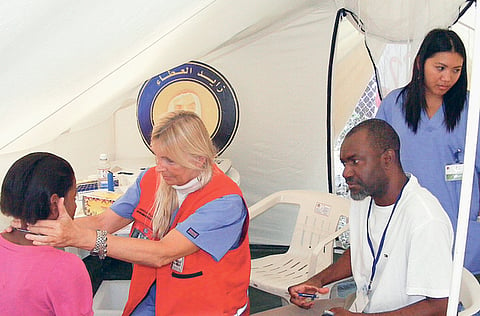UAE Red Crescent swings into action to help Haiti quake victims
More than Dh500,000 already given and aid planes on way to Haiti

Abu Dhabi: Within the past week, the UAE Red Crescent (UAERC) has begun a mission to help those affected by the January 12 Haiti earthquake, which killed 212,000 people and displaced over 1.5 million people, most of whom are in dire need of help.
"The organisation immediately responded to the humanitarian call for help initiated by the International Red Cross and Red Crescent, outside and within Haiti. The Red Crescent implemented various programmes to support those in need. The first phase of the programme was about Dh552,250 to the International Red Crescent and Red Cross, making the UAE Red Crescent a principle contributor to this cause", said Ahmad Humaid Al Mazroui, Board Chairman of the UAE Red Crescent.
Al Mazroui added that "the second phase will include sending a cargo plane with about 45 tonnes of food and essential material to Haiti through Panama, due to its geographical proximity to the disaster area, and to deliver the support material."
"This phase will be valued at over Dh918,000 and will be also conducted in coordination with the International Red Crescent," said Al Mazroui.
Free medicine
"Additionally, the UAE Red Crescent has sent another plane with about 100 tonnes of foods and support products through the Dominican Republic, which will then be transported on land to Haiti," said Al Mazroui.
"Our primary concern is for the health and well-being of the people of Haiti. The UAE's support included sending a medical delegation from the International UAE Hospital to Port-au-Prince, the Haitian capital. During their 10-day stay, the medical delegation provided free medicine and health care to over 1,200 people who were either sick or injured. Additionally, the International UAE Hospital donated over Dh3 million to Haitian hospitals," said Al Mazroui.
"The UAERC is ready to respond to any urgent appeal by UN food agencies to ease the plight of refugees anywhere in the world," Al Mazroui said.
"The United Arab Emirates Red Crescent [UAERC] last year dispatched to Gaza, for example, several convoys of food and other goods worth millions of dirhams in operations coordinated between the UAERC, the United Nations Relief and Works Agency (UNRWA), and the Egyptian Red Crescent [ERC]."
"In addition, the Red Crescent Society of the United Arab Emirates supports Unicef's involvement in Lebanon's recovery following the domestic conflicts within the past few years.
"Under an agreement signed with the Lebanese government, the UAE Red Crescent has provided millions towards Unicef projects in southern Lebanon, covering water supply, health and education. About half the funds go towards the reconstruction of drinking water systems which suffered severe damage during the bombardment," Al Mazroui told Gulf News.
Humanitarian support to Yemen has exceeded Dh100 million since 1994, and includes food, construction, health programmes and care for orphans.
The organisation has strengthened its presence in Yemen, providing in excess of Dh23 million in support. Construction and civil programmes exceeded Dh18 million, to include 190 mosques, 44 schools, 11 health centres, 77 water delivery networks, and an ongoing programme to build two residential cities with over 1,000 houses for those affected by the floods in the Mahra area where the damage exceeded Dh100 million.
Desalination plants
Recently, the Red Crescent also began construction on the Mazraq-2 compound for those impacted by the fighting in northern Yemen. The compounds can house over 7,000 displaced, and consist of 1,000 tents in the state of Hajja, providing food, health care and education.
Humanitarian support to Afghanistan exceeded Dh91 million in the past 10 years, of which Dh43 million went to construction, civil and health programmes, which includes 30 programmes to build the country's infrastructure, and Dh47 million for humanitarian and nutritional support.
Shaikh Zayed City in Kabul is an exemplary example of the support programmes, consisting of over 200 homes, two schools, a medical centre and a mosque, in addition to a network of roads, electrical and water installations, desalinisation plants and a fence around the city at a total cost exceeding Dh23 million.
